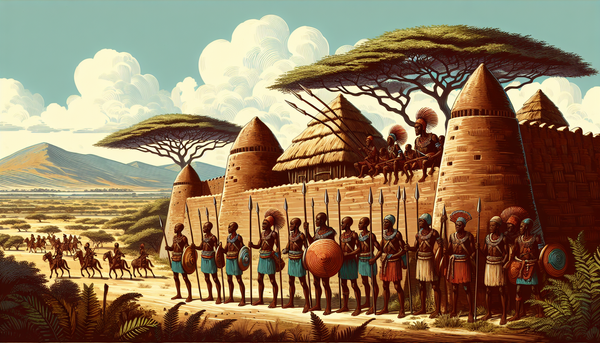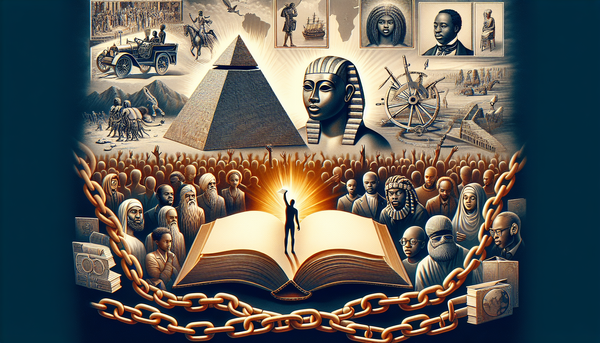Major African Leaders and Their Contributions to History

Introduction to Influential African Leaders and Their Historical Context
Throughout history, Africa has been home to a multitude of influential leaders who have left a lasting impact on their countries and the continent as a whole. These leaders have navigated complex historical contexts, challenging colonial legacies, and social upheavals to shape the political, social, and economic landscapes of their nations.
From the towering figure of Haile Selassie in Ethiopia to the revolutionary spirit of Thomas Sankara in Burkina Faso, African leaders have exhibited diverse leadership styles and ideologies in their quest to advance their countries and empower their people. Their contributions have ranged from promoting democracy and women's rights to advocating for socio-economic reforms and African unity.
Understanding the historical context in which these leaders emerged is crucial to appreciating the significance of their actions and policies. As we delve into the lives and legacies of these prominent figures, we uncover a tapestry of struggles, achievements, and aspirations that have shaped the course of African history and continue to resonate in the present day.
Haile Selassie: Modernization Efforts and Anti-Colonial Stand in Ethiopia
Haile Selassie, Emperor of Ethiopia from 1930 to 1974, was a transformative leader known for his modernization efforts and staunch opposition to colonialism. Under his reign, Ethiopia underwent significant infrastructural developments, including the construction of roads, schools, and hospitals, aimed at advancing the country into the modern era.
Selassie's anti-colonial stance was exemplified by Ethiopia's successful resistance against Italian invasion during the Second Italo-Ethiopian War, where he rallied his people to defend their sovereignty and independence. His speech addressing the League of Nations following Italy's invasion, decrying the violation of Ethiopia's rights, remains a powerful symbol of defiance against colonial aggression.
Despite facing internal challenges and criticisms regarding his leadership, Selassie's commitment to modernizing Ethiopia and preserving its independence cemented his legacy as a national hero and pan-African figure. His efforts to modernize Ethiopia and his unwavering stand against colonial powers continue to inspire generations in Ethiopia and across the African continent.
Patrice Lumumba: Vision for Congo’s Independence and Unity
Patrice Lumumba, the first democratically elected Prime Minister of the Democratic Republic of Congo, was a visionary leader with a fervent commitment to his country's independence and unity. Lumumba's rise to power during the decolonization era marked a crucial period in Congolese history, as he sought to navigate the complexities of nation-building and post-colonial governance.
Lumumba's vision for Congo was rooted in the principles of self-determination, sovereignty, and Pan-African solidarity. He advocated for a unified and independent Congo, free from foreign influence and exploitation. Despite facing internal divisions, external pressures, and political challenges, Lumumba remained steadfast in his dedication to realizing a united and prosperous nation.
Tragically, Lumumba's leadership was cut short by political turmoil and external intervention, leading to his untimely assassination in 1961. However, his legacy as a champion of independence and unity continues to resonate in the hearts of many Congolese people and African leaders alike. Patrice Lumumba's vision and sacrifice remain a symbol of courage and determination in the pursuit of a better future for Congo and Africa as a whole.
Thomas Sankara: Revolutionary Policies and Social Changes in Burkina Faso
Thomas Sankara, often referred to as "Africa's Che Guevara," was a charismatic and revolutionary leader who served as the President of Burkina Faso from 1983 to 1987. Sankara's tenure was characterized by bold and progressive policies aimed at transforming Burkina Faso into a self-reliant, egalitarian, and socially just society.
Sankara's revolutionary agenda included land reforms, women's rights advocacy, and mass mobilization campaigns to promote literacy and health among the population. His government prioritized education, healthcare, and agricultural development, with a focus on empowering the marginalized and downtrodden segments of society.
Under Sankara's leadership, Burkina Faso experienced significant social changes and economic advancements, earning him a reputation as a visionary leader with a deep commitment to his people. Despite his short time in power and tragic end, Sankara's legacy as a champion of social justice, anti-imperialism, and African self-reliance lives on, inspiring generations of activists and leaders across the continent.
Ellen Johnson Sirleaf: Advancements in Women’s Rights and Democratic Governance in Liberia
Ellen Johnson Sirleaf made history as the first female president in Africa, serving as the President of Liberia from 2006 to 2018. Throughout her tenure, Sirleaf made significant strides in promoting women's rights and gender equality while advancing democratic governance in a post-conflict country.
Sirleaf's leadership was marked by her unwavering commitment to rebuilding Liberia after years of civil war, with a focus on fostering peace, reconciliation, and sustainable development. She implemented policies to empower women economically, politically, and socially, breaking barriers and shattering stereotypes in a traditionally patriarchal society.
As a Nobel Peace Prize laureate, Sirleaf's efforts in promoting good governance, transparency, and accountability earned her international acclaim and recognition. Her leadership paved the way for increased female participation in politics and decision-making roles, setting a precedent for gender equality and women's empowerment in Liberia and beyond.
Ellen Johnson Sirleaf's legacy as a trailblazer for women's rights and democratic governance continues to inspire hope and progress in Liberia and serves as a beacon for aspiring leaders striving for a more inclusive and equitable society.
Julius Nyerere: Implementation of Ujamaa and National Unity in Tanzania
Julius Nyerere, the first President of Tanzania, was a visionary leader known for his implementation of the concept of Ujamaa, which emphasized collective farming, communal living, and self-reliance. Nyerere's ideology aimed to build a socialist society based on African communal values, emphasizing cooperation, equality, and empowerment of the marginalized.
Nyerere's leadership was characterized by his commitment to national unity and social justice, transcending tribal and ethnic divisions to foster a sense of Tanzanian identity. He promoted Swahili as a unifying language and sought to bridge disparities through education, healthcare, and economic development programs.
Despite facing challenges and criticisms, Nyerere's dedication to grassroots mobilization and people-centered policies left a lasting impact on Tanzania's socio-political landscape. His efforts in promoting unity, egalitarianism, and self-reliance contributed to the country's stability and progress, shaping a sense of national identity rooted in solidarity and shared values.
Julius Nyerere's legacy as a proponent of Ujamaa and national unity continues to resonate in Tanzania, inspiring a collective spirit of cooperation and community building for a better and more inclusive future.
Conclusion: Reflecting on the Legacy and Ongoing Impact of These African Leaders
The legacies of African leaders such as Haile Selassie, Patrice Lumumba, Thomas Sankara, Ellen Johnson Sirleaf, and Julius Nyerere showcase a diverse tapestry of leadership styles, ideologies, and accomplishments that have shaped the continent's history and inspired generations. These leaders each demonstrated a strong commitment to their countries' independence, social progress, and unity, leaving indelible marks on their respective nations and the broader African consciousness.
Their visionary policies, revolutionary agendas, and advocacy for women's rights, democracy, and economic development continue to reverberate across Africa and beyond. Through their bold actions and unwavering dedication, they have set a precedent for leadership grounded in integrity, compassion, and a deep-seated belief in the potential for positive change.
As we reflect on the legacies of these remarkable leaders, we are reminded of the enduring impact of their contributions to the continent's socio-political landscape. Their examples serve as beacons of hope and inspiration, urging current and future generations to strive for a more just, equitable, and prosperous Africa built on the principles of unity, self-reliance, and collective progress.



